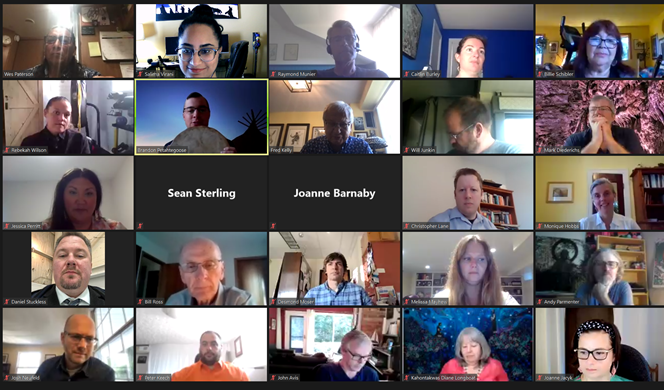The Nuclear Waste Management Organization’s (NWMO) 4th Indigenous Knowledge and Western Science Workshop took place virtually on June 9-10, 2021, with more than 50 people in attendance. Participants included Indigenous Knowledge Keepers, Elders, youth, scientists, and industry professionals. The event was an opportunity to explore the intersections between Indigenous Knowledge and western science with respect to water, and how these two knowledge systems could be interwoven effectively and meaningfully into the NWMO’s work.
Elders Fred Kelly, Diane Longboat and Billie Schibler, and Youth Brandon Petahtegoose, members of the Council of Elders and Youth (an independent advisory body to the NWMO), opened and ended each day of the workshop with traditional Indigenous invocation, and ceremonial song and drumming, and spoke to and acknowledged the special role water plays in all our lives. For Indigenous peoples, it is essential to start all meetings or gatherings by acknowledging the lands we are on as a way of honouring their relationship to Mother Earth. The drum represents the universal heartbeat of Mother Earth, and the openings give thanks to a new day.
When Elder Schibler first joined the Council of Elders (the Youth Council was not fully established at that time), they discussed with the NWMO about being guided by the Creator and about working from your spirit. She shares that, from an Indigenous perspective and teachings from their ancestors, the Creator guides us and at times speaks through us using our spirit as a conduit for important messages or guidance.
She shared her personal experience with water as a Sun dancer, and about what makes water a great teacher.
“When you are dancing that powerful dance to honour life, you make a sacrifice, and it brings you closer to the Creator in your spiritual journey. You are dancing in the heat of the sun often around the summer solstice, and it is a very humbling time. You dance from sunrise to sunset for four days without food or water, sleeping under the stars. You will not miss the food so much, but you really, really miss the water. You certainly recognize the sacredness of water, especially when you can’t have it for four days. That is one of the biggest lessons for me about respecting water and the gifts that it holds for all of creation.”
Workshop discussions explored how Indigenous Knowledge perspectives about the importance of water are like western science perspectives. Water is critical to every one of our cells, and to allowing the function of other chemical constituents of these cells (e.g., DNA, RNA, proteins, membrane lipids). To find life, you must follow the water.
“Water is a requirement for life on Earth, including microbial life in the subsurface and at depths relevant for a deep geological repository,” said Josh D. Neufeld, Microbiologist, Professor and University Research Chair in the Department of Biology at the University of Waterloo.
While Indigenous Knowledge is sophisticated and distinct from western science, these examples remind us that the two do have intersection points. Both knowledge systems make careful observations of the natural world and then interpret these observations to seek a deeper understanding. As well, both systems rely heavily on the wisdom of those who have gone before – Elders, ancestors or literature.
As it is important to recognize the intersection between Indigenous Knowledge and western science, Elder Thrasher shared that it is equally important to acknowledge the differences. A significant difference is that Indigenous Knowledge is not imposed on you. To learn and understand Indigenous Knowledge, you must take that initiative; an Indigenous Knowledge Keeper will not simply offer to share their knowledge with you. Therefore, to do this work meaningfully and respectfully will require conscious effort and hard work.
“I think this is particularly relevant as the uncovering of unmarked graves is coming into the light and is becoming truth for all Canadians and not just Indigenous peoples,” said Elder Thrasher.
Panelist Nick Reo, Associate Professor of Indigenous Environmental Studies at Dartmouth College, goes even further to say that non-Indigenous organizations, partners and individuals cannot cherry-pick what aspects of Indigenous Knowledge they want to use.
“When I hear ‘integrate Indigenous Knowledge,’ sometimes I get an ick moment because I feel like I have encountered too many of these individuals who look for aspects of our knowledge systems that are the most comfortable and familiar and convenient for the work that they are doing and that fit the best in their frameworks. Then, they cherry-pick those and integrate them into what they are doing. It is not helpful, honourable, and does not work.”
This annual workshop continues to be a forum where diverse voices come together to apply the seven sacred grandfather teachings of love, trust, respect, humility, truth, honesty, and wisdom in practical application.
About the NWMO
The Nuclear Waste Management Organization (NWMO) is a not-for-profit organization implementing Canada’s plan to safely contain and isolate used nuclear fuel inside a deep geological repository in a manner that protects people and the environment for generations to come.
Canada’s plan will only proceed in an area with informed and willing hosts, where the municipality, First Nation and Métis communities, and others in the area are working together to implement it. The NWMO plans to select a site in 2023, and two areas remain in our site selection process: the Ignace area and South Bruce, both in Ontario.

